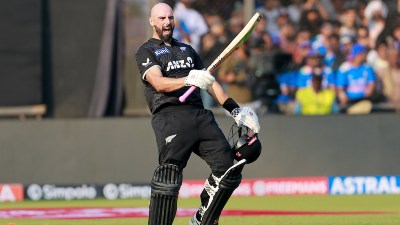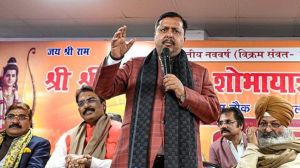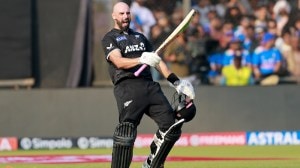On A Short Circuit
...

| Reaching Bombay Central By Shama Futehally Viking India Price: Rs 225 |
This is a book that is short in length. Short in strength. And terribly short in plot and context. So before you are lured by the tension-building questions posed on the jacket cover 8212; 8220;How long will this go on? Can she tell her new friends the truth and be done with it? Will anything ever look beautiful again?8221; 8212; act with haste and drop the book.
Shama Futehally8217;s new novel certainly asks those questions but with none of the drama or depth that they are posed with.
Ayesha Jamal is on a train to Mumbai to save her husband8217;s professional life. Tense and disconsolate, she finds herself in the midst of a diverse set of travelling compani-
ons. They are all walking cliches. A brash journalist 8212; brash according to Ayesha because he wears 8220;sports shoes8221;. A self-confident young girl who for some odd reason 8220;intrigues8221; Ayesha. And a 8220;self-important and solicitous8221; politician. The biggest cliche though is the fact that by the end of the tale not one of them fits the neat little pigeonhole he or she is slotted into.
So in between endless conversations on the veg and non-veg thalis served on the train and the filling and refilling of water bottles, there is the tedious conversation between the travellers of Compartment C. Soap boxes are offered without soap, unbreakable plastic cups crash to the floor in many pieces, and the demerits of oily food are also discussed.
For relief there are the meanderings of Ayesha into her past and the 8220;tense8221; run-up to her husband8217;s downfall.
To be fair to this National School Of Drama teacher, her characters do exist. If not in whole then surely in parts. Chances are that every train journey is marred by a MP/MLA who wants his berth upgraded. Also, the very nature of train travel does result in great bonding. In part, Futehally has managed to capture some of that. But only briefly.
In her attempt to speak 8220;the language8221; of the people, she ends up presenting a badly written book. Worse still, a sloppy book. To garner sympathy for her character she makes her a Hindu married to a Muslim. Then at every moment she emphasises it. The great Indian stereotype does exist. 8220;I also have many Muslim friends,8221; says the politician.
8220;And as she pronounced the word 8216;Jamal8217; one of the young men glanced at the others.8221; Then everything Ayesha feels is touched by exaggerated emotionality. She is always teetering on the brink of despair 8212; or alternately, hope. But predictably so. And with boring regularity.
The book is a celebration of the Great Indian Stereotype. Tragically the writing also falls into the trap of the stereotype. And therefore has no redeeming qualities.
However it isn8217;t alone. Bookstores are currently choc-a-bloc with similar sad stories. And the reference here is to the quality of writing that is finding its way into print. Is this an alarming trend? A result of the pretension that tends to creep into Indian writing in English? Not really. The simple truth about literature is that good writing is good writing and bad writing is, well, awful. They co-exist 8212; but frankly, shouldn8217;t be allowed to.
Nonita Kalra is executive editor, ELLE.
- 01
- 02
- 03
- 04
- 05































